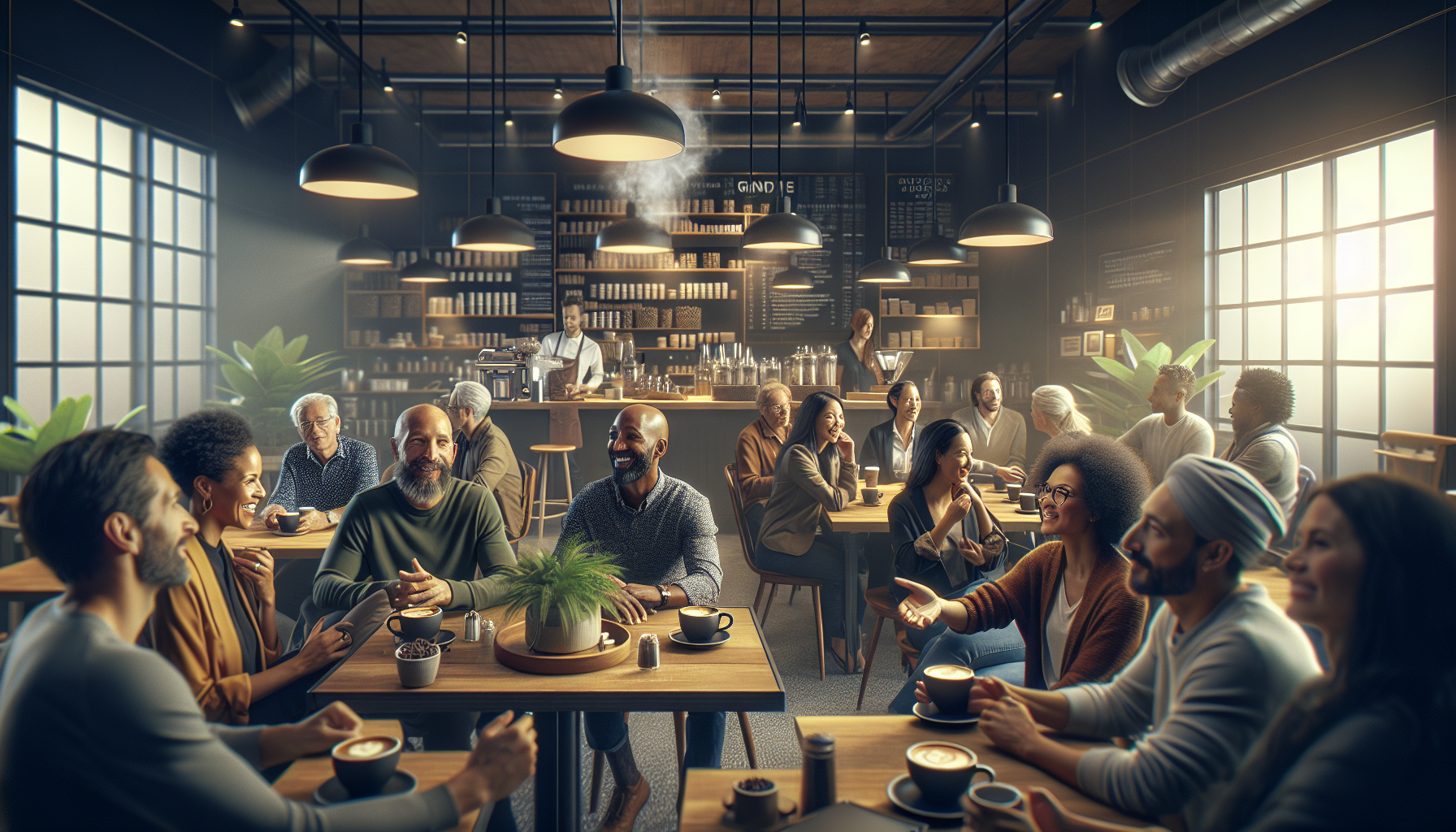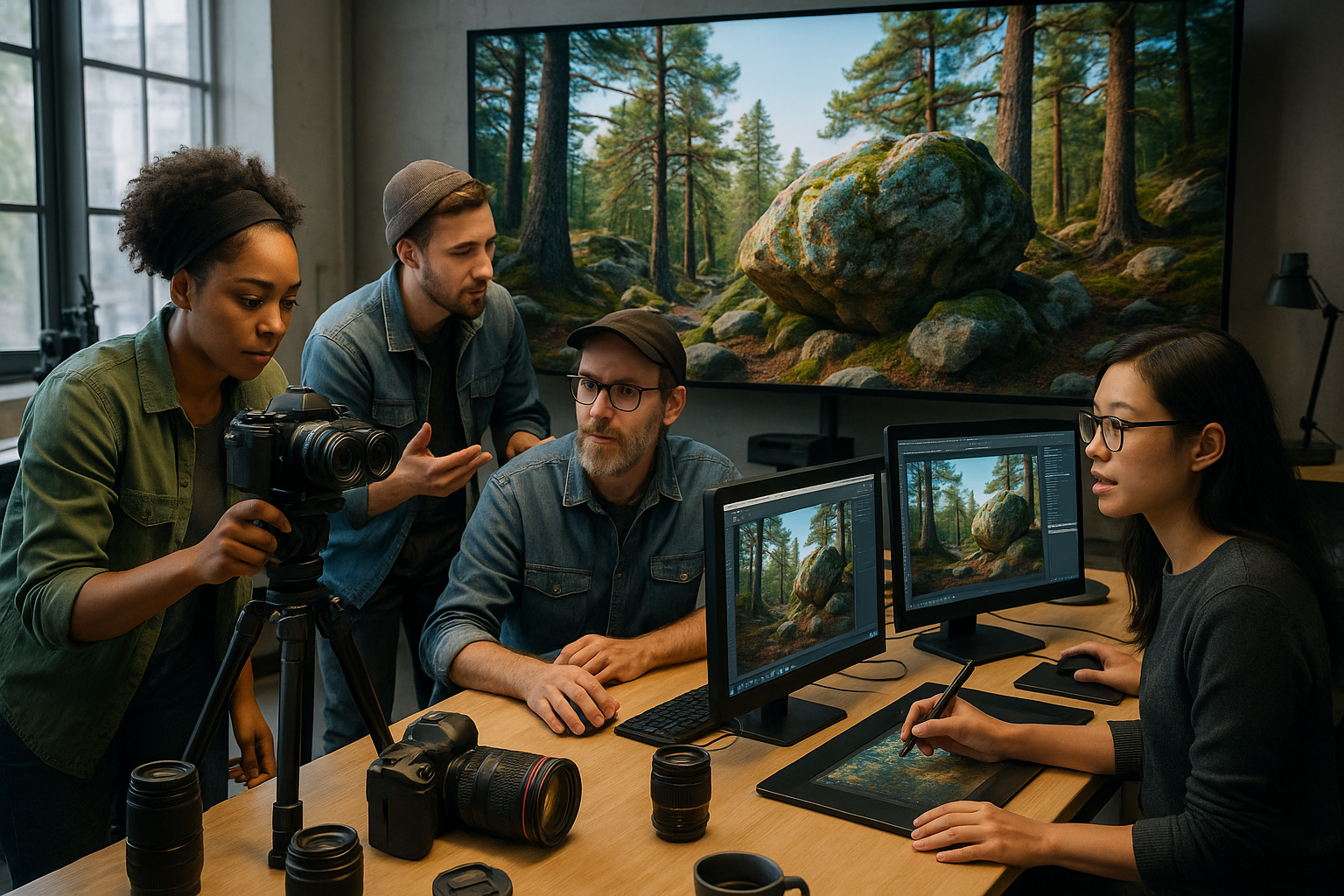In a world that often seems to move at the speed of light, where digital connections are but a click away, and face-to-face interactions are becoming increasingly rare, there remains a timeless ritual that continues to unite us: the sharing of a cup of coffee. This simple act, often accompanied by meaningful conversation, transcends cultures, generations, and geographical boundaries. It is in this context that “Grinder: Connecting Communities One Cup at a Time” emerges as a beacon of hope, rekindling the warmth of human connection through the universal language of coffee. ☕
Coffee, as we know it today, is more than just a caffeinated beverage; it is a catalyst for community. From the bustling cafés of Paris to the quiet coffee shops in rural towns, the aroma of freshly ground beans invites people to pause, savor the moment, and engage in dialogue. At its core, coffee is about more than its taste or its energizing properties—it is about the experience it fosters. “Grinder” understands this intrinsic value and seeks to cultivate these experiences by bridging the gap between strangers, friends, and family members alike. Through its initiatives, “Grinder” is creating spaces where conversations flourish and relationships are forged.
As we journey through this exploration of “Grinder,” we will delve into the multifaceted role that coffee plays in our social lives. We will uncover how “Grinder” is innovatively harnessing the power of this age-old tradition to foster a sense of belonging and community. This article will highlight the stories of individuals who have found companionship and camaraderie through their interactions with “Grinder,” illustrating the profound impact a simple cup of coffee can have. Furthermore, we will examine the ways in which “Grinder” supports local businesses and promotes sustainable practices, ensuring that the benefits of community-building extend to all facets of society.
In an era where loneliness is often described as an epidemic, the need for genuine human connection has never been greater. The initiatives undertaken by “Grinder” offer a refreshing reminder of the joy that can be found in shared experiences. Whether it’s through hosting community events, supporting local artisans, or simply providing a welcoming environment for conversation, “Grinder” is at the forefront of a movement that prioritizes people over profit. By encouraging meaningful interactions, “Grinder” not only enriches individual lives but also strengthens the fabric of society.
Join us as we embark on this enlightening journey into the heart of “Grinder: Connecting Communities One Cup at a Time.” Through an in-depth analysis of its impact and success, we aim to inspire readers to embrace the power of coffee and conversation in their own lives. Together, let us celebrate the connections forged over countless cups, and explore how, with each sip, we can create a more connected, compassionate world. 🌍
The Evolution of Coffee Culture
Coffee has long been more than just a beverage; it is a cultural phenomenon that has evolved over centuries to become a global staple. The journey of coffee from the highlands of Ethiopia to the urban cafes of the 21st century is a testament to its power to connect people, cultures, and communities. The rich history of coffee is intertwined with stories of trade, exploration, and cultural exchange. Today, coffee is a central part of social gatherings and a catalyst for conversations across the globe.
The coffee culture as we know it today began to take shape in the 15th century in the Sufi monasteries of Yemen, where the drink was used to aid concentration and spiritual contemplation. From there, coffee spread to the Middle East, Persia, and the Ottoman Empire, before making its way to Europe in the 17th century. The first coffeehouses, known as “qahveh khaneh” in the Middle East, became popular meeting places for intellectuals and artists, serving as hubs for political discussion and cultural exchange.
In Europe, coffeehouses quickly gained popularity and became known as “penny universities” for their role in fostering intellectual discussion and debate. Coffee’s spread across the world continued with the colonization of the Americas, where the ideal conditions for coffee cultivation were found in countries like Brazil and Colombia. The 20th century saw the rise of global coffee chains, which brought coffee culture to the masses, making it more accessible and diverse than ever before.
Coffee and Community: A Global Perspective
Today, coffee is an integral part of many cultures, with each region offering its unique take on the beloved beverage. In Italy, espresso bars are a staple, where locals gather for quick, invigorating shots of espresso. In contrast, Scandinavian countries favor the concept of “fika,” a leisurely coffee break accompanied by pastries and conversation. In Turkey, coffee is brewed using a traditional method that dates back centuries, often served in ornate cups during social gatherings.
In recent years, the rise of specialty coffee has further enriched the coffee culture. This movement emphasizes high-quality beans, sustainable sourcing, and expert brewing techniques. Specialty coffee shops have become community hubs, attracting coffee enthusiasts who seek more than just a caffeine fix. These establishments often host events such as coffee tastings, workshops, and talks, fostering a sense of community among patrons and baristas alike.
The Role of Coffee in Social Interaction
Coffee’s role as a social lubricant is undeniable. It provides a common ground for people to come together, share stories, and build relationships. Whether it’s a business meeting, a first date, or a casual catch-up with friends, coffee serves as the backdrop for countless interactions. Its versatility and ubiquity make it an ideal choice for social gatherings, offering something for everyone, from the casual drinker to the connoisseur.
Coffeehouses, in particular, play a significant role in facilitating social interaction. They provide a welcoming space for people to gather, work, and socialize. The ambiance of a coffeehouse is often designed to encourage conversation, with comfortable seating, soft lighting, and the inviting aroma of freshly brewed coffee. Many coffeehouses also offer free Wi-Fi, making them popular spots for remote workers and students looking for a change of scenery.
The impact of coffee on social interaction is further exemplified by its role in networking and professional development. Business professionals often use coffee meetings as an informal way to connect with colleagues, clients, and potential partners. This relaxed setting allows for open dialogue and relationship building, making coffee a valuable tool for professional networking.
Coffee and Conversation: Bridging Cultural Divides
Coffee’s ability to bring people together extends beyond individual interactions; it has the power to bridge cultural divides and foster understanding between diverse groups. In multicultural societies, coffeehouses often serve as melting pots, where people from different backgrounds come together to share their stories and learn from one another. This cultural exchange is facilitated by the universal appeal of coffee, which transcends linguistic and cultural barriers.
Furthermore, coffee has played a role in international diplomacy and peacebuilding efforts. The concept of “coffee diplomacy” refers to the use of coffee as a tool for fostering dialogue and cooperation between nations. This approach has been used in various contexts, from trade negotiations to peace talks, highlighting coffee’s potential as a unifying force.
For a deeper exploration of how coffee unites people, watch this insightful video from the channel “Coffee Culture”: Coffee: A Global Connection – Coffee Culture.
Innovative Coffee Practices
The world of coffee is constantly evolving, with new practices and innovations emerging regularly. From sustainable farming techniques to cutting-edge brewing methods, the coffee industry is at the forefront of innovation. One of the most significant trends in recent years is the focus on sustainability and ethical sourcing, with consumers increasingly demanding transparency and accountability from coffee producers.
Many coffee farmers are adopting organic farming practices to minimize their environmental impact and improve the quality of their beans. This approach often involves using natural fertilizers, conserving water, and protecting biodiversity. By prioritizing sustainability, these farmers are not only producing better coffee but also contributing to the preservation of the environment for future generations.
In the realm of brewing, technological advancements have led to the development of new devices and techniques that enhance the coffee experience. From precision espresso machines to cold brew systems, these innovations offer coffee lovers more control over the brewing process and allow them to experiment with different flavors and styles. The rise of home brewing has also led to an increase in the popularity of manual brewing methods, such as pour-over and AeroPress, which offer a hands-on approach to crafting the perfect cup.
Emerging Trends in Coffee
The coffee industry is also witnessing a shift towards experiential and personalized experiences. Coffee shops are increasingly offering unique and immersive experiences, such as latte art classes, coffee-themed events, and curated tasting menus. These experiences allow customers to engage with coffee on a deeper level and appreciate the artistry and craftsmanship involved in its preparation.
Additionally, the rise of coffee subscriptions and direct-to-consumer models has transformed the way people access and enjoy coffee. These services provide customers with a curated selection of high-quality beans delivered straight to their door, often with detailed tasting notes and brewing recommendations. This approach not only supports small-scale farmers and roasters but also offers consumers the opportunity to explore new and exciting coffee varieties from around the world.
As the coffee industry continues to innovate and evolve, it remains a powerful force for connecting communities and fostering social interaction. Whether through a simple cup of coffee shared between friends or a global movement for sustainable and ethical practices, coffee continues to unite people and cultures around the world.
| Aspect | Traditional Coffee | Specialty Coffee |
|---|---|---|
| Focus | Convenience, accessibility | Quality, sustainability |
| Consumer Experience | Standardized, familiar | Personalized, diverse |
| Production | Mass-produced | Small-batch, artisanal |
| Impact | Wide-reaching, global | Community-focused, local |
For more on innovative coffee practices, watch this video from “Coffee Science”: Innovations in Coffee Brewing – Coffee Science.
- Explore different coffee cultures and their unique brewing methods.
- Visit local coffee shops to experience specialty coffee firsthand.
- Engage with online coffee communities to share and discover new trends.

Conclusion
Conclusion: Connecting Over Coffee: A Catalyst for Community and Conversation
In our exploration of the theme “Grinder: Connecting Communities One Cup at a Time – Uniting People Through Coffee and Conversation,” we’ve delved into the profound impact that a simple cup of coffee can have in bridging divides and fostering meaningful connections among people from diverse backgrounds. Through this lens, we have identified several key points that underscore the importance of this universal beverage as more than just a daily ritual, but as a powerful medium for social interaction and community building.
Firstly, we discussed the historical and cultural significance of coffee, highlighting how it has evolved over centuries to become a central element in social gatherings worldwide. From the coffee houses of the Ottoman Empire to contemporary cafés in bustling urban centers, coffee has served as a common denominator that brings people together, transcending cultural and geographical boundaries.
Secondly, we examined the role of coffee shops as modern-day community hubs. These spaces offer more than just a place to enjoy a beverage; they provide an environment where individuals can engage in dialogue, share ideas, and build relationships. The ambiance of a coffee shop, with its inviting aroma and cozy atmosphere, encourages patrons to linger, converse, and connect on a deeper level. Whether it’s a casual chat between friends or a chance meeting that sparks a new collaboration, coffee shops facilitate interactions that might not occur in other settings.
Moreover, we considered the economic and social contributions of the coffee industry. By supporting local businesses and promoting sustainable practices, coffee enthusiasts can contribute to economic growth and environmental preservation. The rise of ethically sourced coffee reflects a growing awareness and responsibility among consumers to make choices that positively impact the world.
Our discussion also highlighted the innovative ways technology is enhancing the coffee experience. From apps that streamline the ordering process to online platforms that connect coffee aficionados across the globe, technology is expanding the reach and influence of coffee culture. These advancements not only enhance convenience but also provide opportunities for virtual connections, allowing people to share their passion for coffee regardless of physical distance.
The importance of coffee in fostering a sense of belonging cannot be overstated. In a world where digital communication often overshadows face-to-face interaction, coffee remains a tangible, sensory experience that encourages people to slow down and engage with one another on a personal level. It acts as a social lubricant, breaking down barriers and creating a shared space for dialogue and understanding.
As we conclude, it’s essential to recognize the power of coffee as a tool for community building and personal connection. The next time you enjoy a cup of coffee, consider its potential to open doors to new conversations and relationships. Whether you’re at a local café or brewing a pot at home, use this moment to engage with those around you, share your thoughts, and listen to the stories of others.
We invite you to reflect on how you can leverage coffee as a means to connect with your community. Perhaps you’ll organize a coffee meet-up, support a local coffee shop, or simply take a moment to enjoy a meaningful conversation with a friend or colleague over a cup. By doing so, you contribute to a world where coffee continues to unite people, one cup at a time.
We encourage you to share your experiences and insights in the comments section below. How has coffee played a role in your personal or professional life? What memorable connections have you made over a cup of coffee? Your stories and perspectives enrich the dialogue and inspire others to discover the unifying power of coffee.
Let’s continue this conversation beyond the confines of this article. Share this piece with friends and colleagues who might find value in the discussion. Together, we can cultivate a global community that appreciates the significance of coffee as a conduit for connection and camaraderie.
Thank you for joining us on this journey of exploration and discovery. May your next cup of coffee be a reminder of the potential it holds to unite, inspire, and connect us all. ☕🌍
Toni Santos is a visual historian and artisan whose creative lens is captivated by the forgotten marvels of antique optical devices. Through his thoughtful storytelling, Toni revives the instruments that once transformed light into wonder—camera obscuras, magic lanterns, kaleidoscopes, and other ingenious tools that shaped our earliest visual imaginations.
His journey is rooted in a fascination with how humans have long sought to bend, reflect, and reveal the unseen. Whether tracing the mechanical poetry of 19th-century projectors or illustrating the tactile elegance of early lenses, Toni’s work invites us to see vision itself as an evolving art form.
Blending handcrafted design with historical inquiry, Toni brings to life the material soul of these devices—celebrating not just how they functioned, but what they meant. His creations and curated stories illuminate a world where science, illusion, and beauty were intricately linked through glass and brass.
As the curator of Vizovex, Toni shares detailed studies, reconstructed artifacts, and immersive content that help others rediscover the origins of visual technology and the magic of analog perception.
His work is a tribute to:
The craftsmanship behind early visual instruments
The wonder of seeing through the eyes of another century
The intersection of optics, art, and imagination
Whether you’re a collector, a designer, or someone drawn to the lost poetry of vision, Toni welcomes you into a world where light is a storyteller—one prism, one lens, one forgotten invention at a time.





